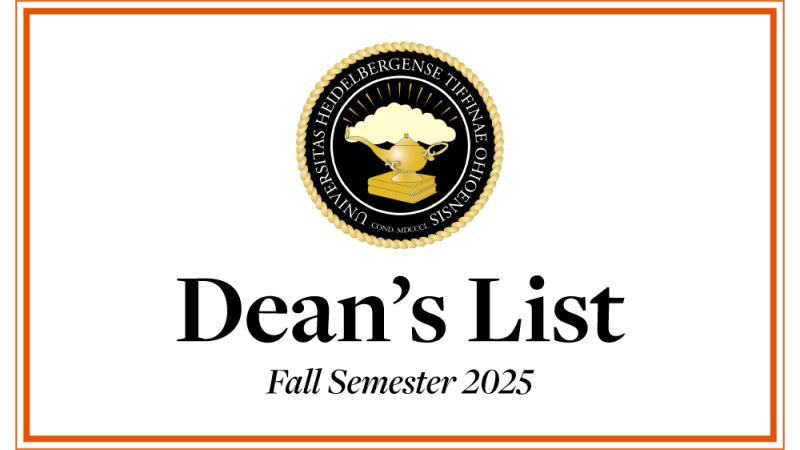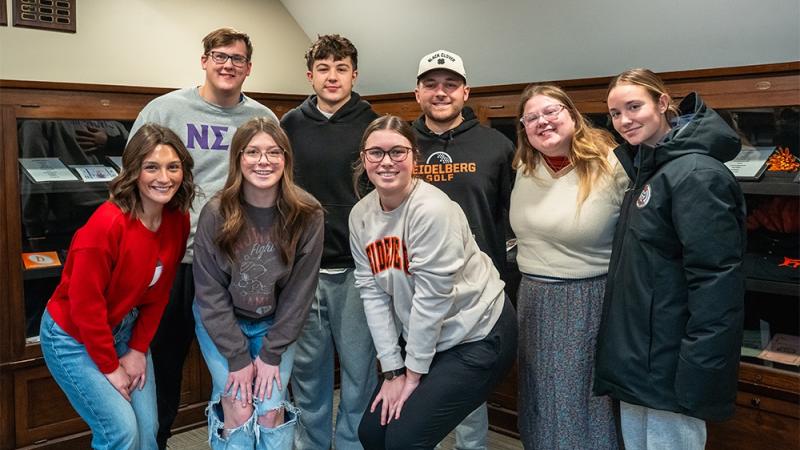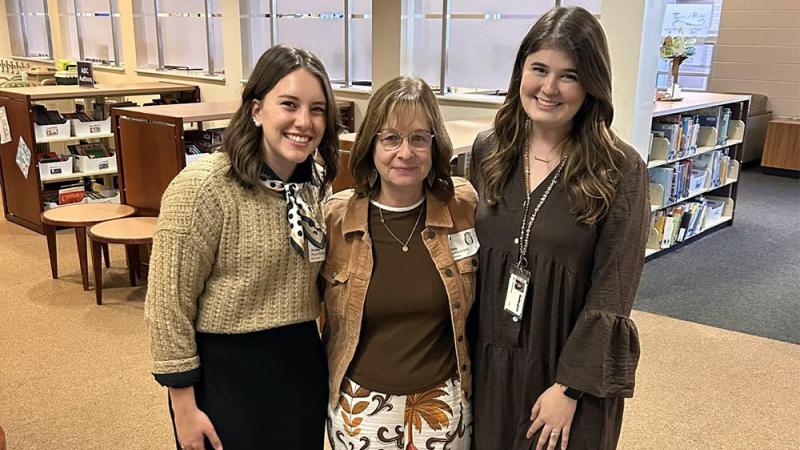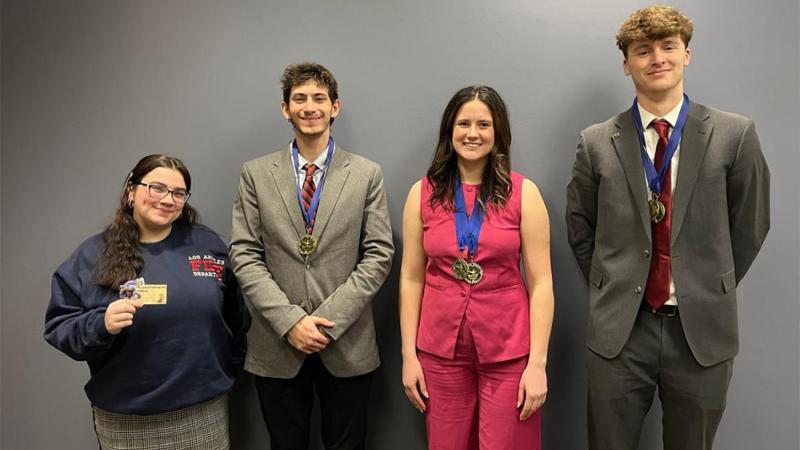Senior recitals forced to go virtual
Senior recitals are the culminating experience for Heidelberg music majors, celebrated with pride and joy by students, families and faculty members alike. But when COVID-19 disrupted the spring semester, sending students home at the midway point, seniors Emma Breyley, Marques Johnson and Will Sweeney had to reimagine their recitals and instead of preparing for live performances, they had to rehearse and perform on a virtual stage.
It wasn’t easy and at least initially, it wasn’t much fun, but they pushed through and conquered lots of adversity. The end result is a beautiful demonstration of their talents, creativity, artistry and flexibility. What would have been beautiful performances on the Ohl Concert Hall stage now live forever on YouTube.
Because the students were too far into the process when the pandemic forced the university to close in early March, canceling the recitals and substituting something else wasn’t an option, says Dr. Carol Dusdieker, director of the School of Music & Theatre. “We just didn’t want to go in that direction,” she says. “So we studied what other schools were doing and then, our faculty members got really creative to make the experience feel as organic as possible for the students.”
Emma had decided to produce a demo tape to showcase her vocal abilities with cover songs of strong female artists. She worked heavily on seven songs in the fall and was to have recorded herself and the instruments for each song, edited and mastered each recording to give a high-quality album of covers.
“When I realized I wasn’t going to have the ability to use the resources on campus, I had to change the format in which I was going to produce my product. I did not have the software that I was most comfortable using, little to no access to people and instruments I was going to use to record the accompaniments, and I did not have access to the equipment I had planned on using,” Emma explains. “I was a little heartbroken because I was very excited to show everyone what I was truly capable of, and (I thought) my product would not be up to my high standards.”
Marques, a tuba player, was overcome with sadness when he learned he would not be able to give a live performance, but it was short-lived. “I feel that it is easier to allow for more musician interpretation between the soloist and accompaniment during a live performance,” he says. But his disappointment quickly turned to relief when he realized he’d have extra time to prepare.
Will reacted perhaps most strongly. “I’ll be honest … I didn’t see a point in having a recital if I wasn’t able to give it in person,” he says. “When I heard we would have to make videos and practice with pre-recorded tracks from our pianists, I was less than enthused.” But his attitude changed when he realized why he became a music major. “I love to sing and I love to sing the songs on my recital, so I decided to see the brighter side of things and just go with it.”
He chose the repertoire for his recital over time, and with his voice professor, selected three English art songs, two German pieces, two Italian pieces and one musical theatre piece.
Zooming in on rehearsals
Preparing and rehearsing virtually presented its own set of frustrations for everyone.
Will, who studied voice, had to get beyond the anxiety of rehearsing in front of his parents, who had only ever heard “the finished product.” It wasn’t easy, but he figured it out. “At one point, Dr. Clair and I just muted Zoom and called each other because the audio was so much better through the phone,” he says. He also relearned how to sing with his accompanist.
“Sometimes, I wanted to save myself the trouble and just sing with the accompaniment tracks because we have to follow the pianist instead of them following us, so I had to reteach my brain,” he explains. “Thankfully, my wonderful accompanist, Cynthia Ramsdell, knows me well and did her best to emulate how I like to sing and where I like to take my time and be more musical.”
Marques encountered some technical issues that were “nerve-wracking” – challenges like matching his sound and volume to the prerecorded piano tracks. Sometimes, he found himself with at least 10 recordings for a single song.
“Listening to your own product over and over makes it very easy to pick out the slightest things that are wrong,” he explains. “Finding the right way to position the mic, how to set the gain and volume were nerve-wracking.” But he persevered.
Emma agrees. For her, the biggest challenge was the unlimited “takes” she had recorded for her recital to post to YouTube. “We could nitpick and perfect anything that we wanted to because we could record and re-record.” After realizing this intense critique isn’t possible in a live performance, she decided to just ease up on her perfectionism.
Changing on the fly
After setting aside their disappointment about not getting to do a live performance, the students got flexible and saw this as an opportunity. Emma found herself using her knowledge gained over the past four years to become her own teacher.
“There was only so much that my voice professor could do to help me through Zoom,” she says. “I became more self-aware and less critical of myself, yet more analytical. I learned how to not be as hard on myself.”
Professors, accompanists step up
Once the students got past their initial anxieties, they leaned heavily on their professors and accompanists to polish their work. Carol credits staff accompanists Cynthia Ramsdell and Emily Morin, who worked closely with the students to craft accompaniment tracks. By now, the process was already much more labor-intensive, with a higher expectation of perfection on videos. “From a musical standpoint, the accompanists did a great job connecting with the students so they could have an authentic experience,” Carol says.
The creativity and commitment of the accompanists was key, along with professors Jon Waters, Renee Clair and Carol, who put in a lot of sweat equity to guide the students through this new process.
“We really got behind the students and their passions,” she says. “We believed in them and nurtured them, and they ended up with a great product.”
The show must go on
And it did. “These students took an obstacle, a difficult situation, and made it theirs. They performed with joy and their program notes were beautifully prepared,” Carol says. “They went above and beyond the requirements in preparation and artistry, as well as the joy they brought to their projects.”
With her project now complete, Emma sees the big-picture value of the experience. “I was given the most accurate process that real life has: things will change and you have to adapt at a moment’s notice.”
Emma, Marques and Will are now officially graduates of Heidelberg, and they have a professional video to add to their portfolios as they apply for jobs. The School of Music & Theatre makes it a practice to record audio and video of recitals and give students access to those files. But they’ve never been encouraged to manipulate the files to video. The pandemic changed all that, and it may just benefit students going forward.
A loud standing ovation for each of them, their professors and their accompanists!




